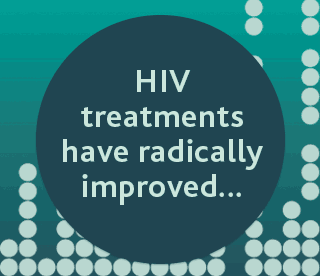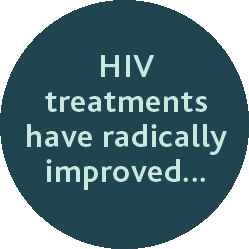


This website describes drugs for the treatment and management of HIV infection. It also describes some common tests used to monitor the health of people with HIV, and how these tests can be used to make decisions about starting or changing antiviral treatments.
This website is for all people with HIV whether currently on treatment or not, and whether thinking about starting, delaying or changing treatment. It is for people recently diagnosed and for those who have known about their HIV positive status for some time.
The information on this website is designed to help you:
- understand how HIV treatments work, and what drugs are currently available
- understand the different tests which might be suggested by your doctor to help monitor your health
- work with your doctor to come up with the most appropriate HIV treatment and management strategy for you
It also contains some information about:
- drug side-effects and how they might be managed
- tips for getting the most out of your drugs
It is virtually impossible for any single resource to cover all the issues about living with HIV for all positive people.
This website will not cover the following issues:
- prophylactic drugs or treatments for HIV related opportunistic illnesses
- the treatment, prevention and management of specific side-effects
- depression and other mental health and psychosocial issues for people living with HIV
- complementary or alternative therapies
- co-infection with hepatitis B or C
- women, pregnancy, breast-feeding or treatments for HIV-positive children
- injecting drug use and HIV, and
- detailed strategies for choosing a GP
These issues are well-covered by a range of existing publications which are available through AIDS councils and other organisations or online at www.afao.org.au.
The information contained on this site is general. It is not intended to direct you towards or promote any particular drugs, drug combinations, tests or treatments. People respond differently to HIV treatments and combinations, and this is often difficult to predict. All decisions about how you treat and manage HIV infection should be discussed with your doctor. Ultimately, treating HIV is a personal decision. This site aims to take you through some of the options , but in the end they are your choices to make.
Over the past thirty years, there have been significant advances in the way HIV infection is understood and managed. Since the advent of HIV treatment involving combinations of antiretroviral drugs, deaths from AIDS have dramatically declined and people with HIV on treatments can now expect to live an almost normal life expectancy.
There are a number of changes which have led to these improvements:
- we have a clearer understanding of how HIV works inside the body
- the use of the viral load test measuring the amount of HIV circulating in your blood is standard practice in Australia, Europe and North America. The results of this test can inform treatment decisions and show how well the treatments you are taking are working against HIV
- the use of genotyping and phenotyping assays to measure resistance to antiviral drugs and provide an indication of which drugs and combinations of drugs are working
- we have a clearer idea of the short and long-term side-effects of HIV treatments and how to manage most of them
- the drugs currently available are more effective and better tolerated than ever
As good as current HIV treatments are, they are not perfect nor are they a cure, and for some people, deciding to take HIV treatments raises a number of important issues. You may have questions about side-effects, confidentiality, or how treatments will affect your day-to-day life. Under support and services there is a list of AIDS Councils and HIV positive organisations where you can access counsellors and treatments officers who will be able to help you understand what taking combination therapy might mean for you.
